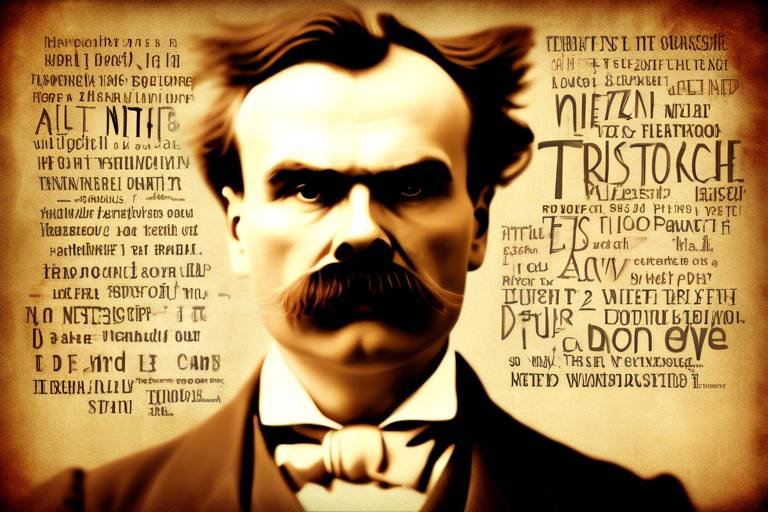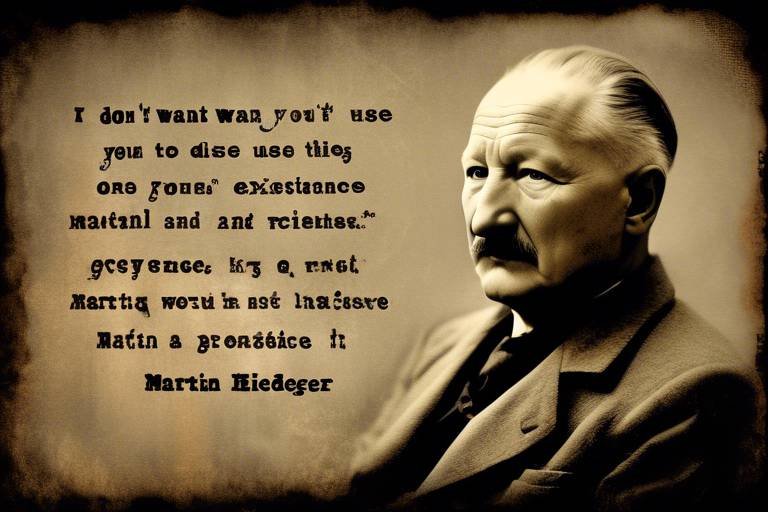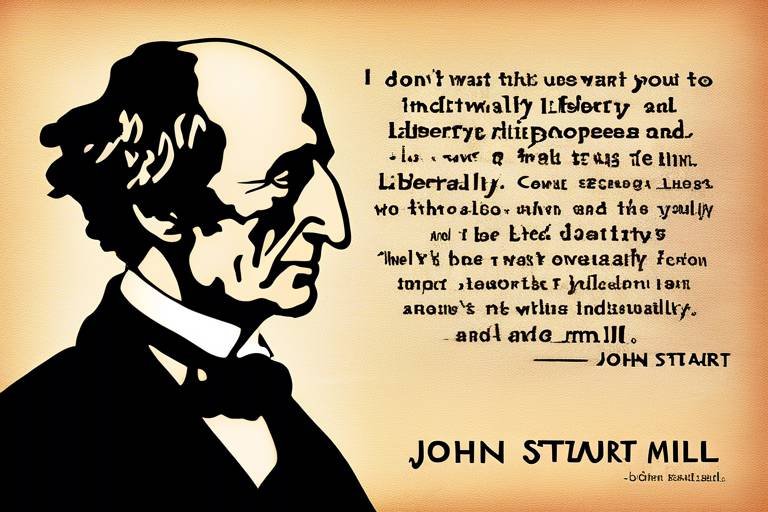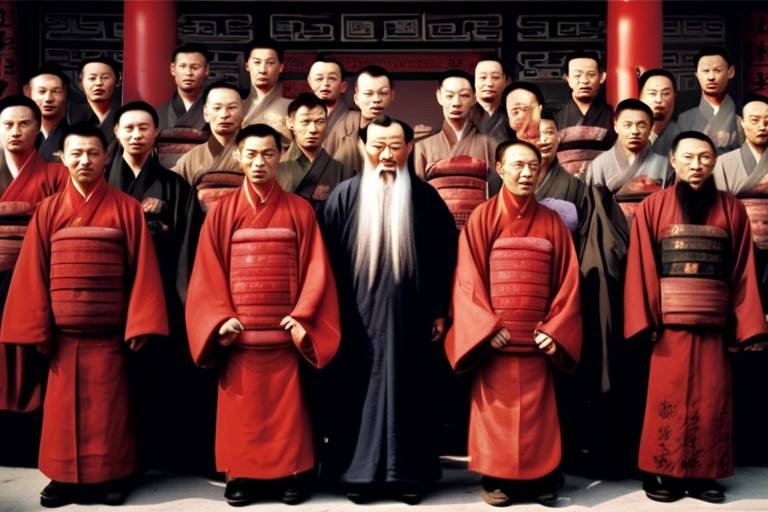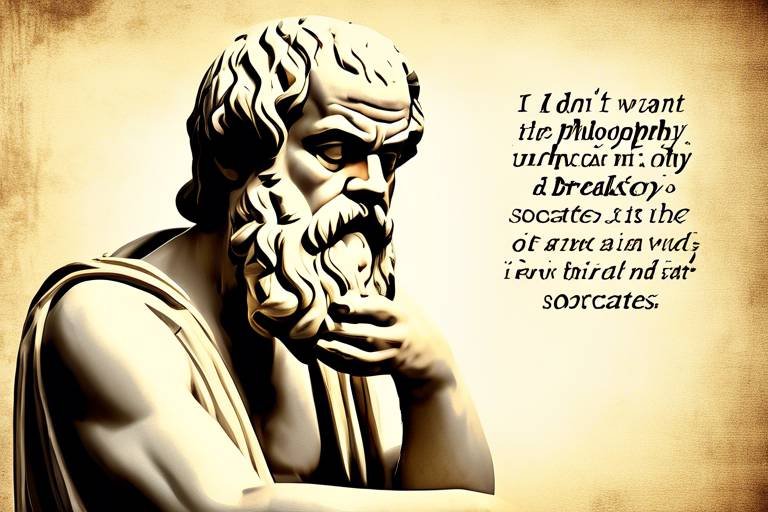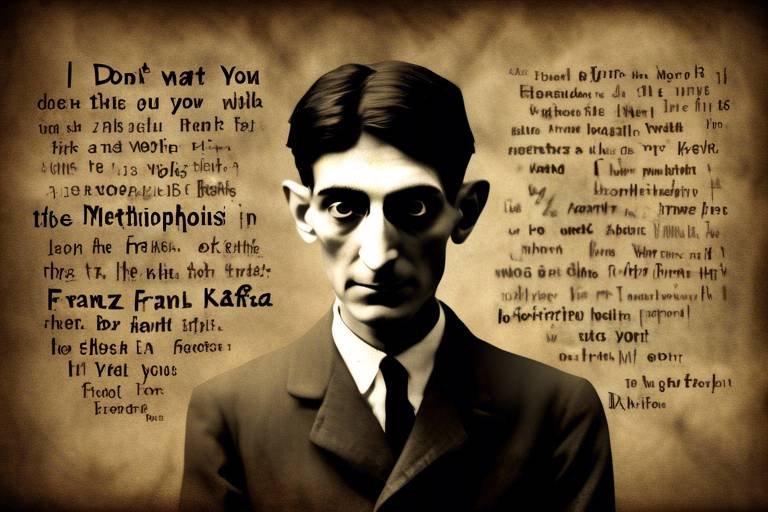How Nietzsche's Philosophy Redefined Morality and Truth?
Friedrich Nietzsche, a name that echoes through the halls of philosophy, challenged our deepest assumptions about morality and truth. His revolutionary ideas not only shook the foundations of traditional beliefs but also paved the way for modern thought across various disciplines. Imagine standing at the edge of a cliff, looking down into the abyss of existential questions. That's where Nietzsche takes us, urging us to confront the void and redefine our understanding of existence. But what does it mean to live in a world where the old moral compass no longer points true north? Nietzsche invites us to explore this unsettling yet liberating territory.
At the heart of Nietzsche's philosophy lies the idea that morality is not a universal truth handed down from above, but rather a human construct, shaped by our experiences, cultures, and societal norms. He believed that traditional morality, often rooted in religious dogma, stifles human potential. Instead of adhering to pre-defined moral codes, Nietzsche encourages individuals to embrace their instincts and create their own values. This radical shift from a collective morality to a personal one compels us to ask: What do I truly believe? What values resonate with my authentic self? In this sense, Nietzsche’s philosophy acts as a catalyst for personal transformation, urging us to become the architects of our own moral frameworks.
Nietzsche's exploration of nihilism serves as a backdrop for understanding his views on truth and morality. Nihilism, in its essence, questions the existence of inherent meaning in life and morality. This concept can feel daunting, as it suggests that without a universal truth, everything is permissible. However, Nietzsche doesn't leave us in despair; instead, he urges us to embrace the freedom that comes with this realization. By acknowledging the absence of absolute truths, we can begin to forge our paths, unencumbered by the weight of outdated moral systems. It’s like shedding a heavy coat on a warm day—liberating and invigorating.
In juxtaposition to traditional morality, Nietzsche introduces the concept of the will to power. This idea is not merely about domination or control; rather, it encapsulates the fundamental drive within humans to assert themselves, to grow, and to thrive. It’s about ambition and success, but in a more profound sense. When we understand the will to power as a driving force behind our actions, we start to see ambition not as a mere quest for wealth or status, but as an expression of our deepest desires and potential. This perspective reshapes how we view personal and societal achievements, inviting us to redefine success on our terms.
Furthermore, Nietzsche's distinction between master morality and slave morality plays a crucial role in his philosophy. Master morality, characterized by strength, creativity, and nobility, celebrates individualism and power. In contrast, slave morality arises from the weak, promoting values such as humility, empathy, and meekness. This dichotomy influences not only personal identity but also societal structures. By recognizing these contrasting moral frameworks, we can better understand the motivations behind our actions and the values we choose to uphold. It's like looking into a mirror that reflects not just our faces, but the very essence of our beliefs.
Nietzsche’s impact extends beyond morality into the realm of existentialism. His rejection of absolute truths opened the door for existentialist thinkers to explore the significance of individual experience and subjective meaning. This shift encourages us to confront our existence head-on, to ask ourselves what it means to be alive in a world devoid of universal truths. It’s a call to arms for those who seek to find meaning in the chaos of life, reminding us that while we may not have all the answers, our experiences and choices shape our understanding of reality.
In conclusion, Nietzsche's philosophy challenges us to rethink our understanding of morality and truth. By embracing nihilism, recognizing the will to power, and differentiating between master and slave morality, we can liberate ourselves from the constraints of traditional thought. His ideas encourage personal growth and the creation of individualized moral frameworks, ultimately leading to a richer, more authentic existence. So, as we navigate the complexities of life, let us remember Nietzsche’s call to become the creators of our values and the masters of our truths.
- What is nihilism in Nietzsche's philosophy?
Nihilism is the belief that life lacks inherent meaning or value, prompting individuals to question traditional moral frameworks. - How does Nietzsche define the will to power?
The will to power is a fundamental drive that motivates individuals to assert themselves, grow, and thrive, shaping their ambitions and actions. - What is the difference between master morality and slave morality?
Master morality values strength and creativity, while slave morality emphasizes humility and empathy, influencing personal and societal values. - How did Nietzsche influence existentialism?
Nietzsche's rejection of absolute truths paved the way for existentialist thinkers to focus on individual experience and subjective meaning.

The Birth of Nihilism
Nihilism, a term that often evokes a sense of dread or confusion, is one of the most profound themes in Friedrich Nietzsche's work. At its core, nihilism questions the very foundations of meaning, morality, and existence itself. Imagine standing on the edge of a vast, empty abyss, staring into a void where traditional beliefs and values once stood firmly in place. Nietzsche invites us to confront this void, suggesting that the absence of inherent meaning in life can be both liberating and terrifying. This philosophical stance challenges us to reconsider our understanding of morality and truth, pushing us to explore the implications of a world where nothing is predetermined.
Nietzsche's exploration of nihilism was not merely an act of despair; rather, it was a call to action. He argued that the decline of religious and metaphysical certainties in the modern era led to a crisis of meaning. With the "death of God," as he famously proclaimed, humanity was left grappling with the consequences of a world stripped of absolute truths. This shift has significant implications for contemporary philosophical discourse, as it forces us to confront the reality that we must create our own values and meanings in a seemingly indifferent universe.
But what does this mean for us today? It means that we are no longer bound by the shackles of traditional morality. Nietzsche encourages us to embrace our freedom to define our own paths, to forge our own destinies, and to live authentically. This perspective is particularly relevant in a world where societal norms often dictate our choices. By recognizing the nihilistic undercurrents in our lives, we can break free from conformity and embrace a more individualized approach to existence.
Furthermore, nihilism opens up a dialogue about the nature of belief systems. In a world where truth is subjective and shaped by personal perspectives, we must ask ourselves: how do we navigate our beliefs? Nietzsche's philosophy suggests that instead of seeking absolute truths, we should focus on the fluidity of our experiences and the narratives we construct around them. This shift in focus can lead to a more profound understanding of our own lives and the lives of others.
In summary, the birth of nihilism in Nietzsche's philosophy serves as both a challenge and an opportunity. It invites us to question the very fabric of our existence while also empowering us to create meaning in a world that often feels devoid of it. As we delve deeper into Nietzsche's thoughts, we uncover not just a critique of traditional morality but a roadmap for personal liberation and self-discovery.
- What is nihilism? Nihilism is the philosophical belief that life lacks inherent meaning, value, or purpose.
- How did Nietzsche contribute to nihilism? Nietzsche explored nihilism as a consequence of the decline of religious and metaphysical beliefs, urging individuals to create their own values.
- Is nihilism a negative philosophy? While it can seem bleak, nihilism can also be liberating, encouraging personal freedom and authenticity in defining one's own meaning.

The Will to Power
Friedrich Nietzsche's concept of the Will to Power is often seen as one of the cornerstones of his philosophy. But what does it really mean? At its core, the Will to Power represents an intrinsic drive that compels individuals to assert and enhance their existence. It's not merely about a desire for domination over others; rather, it's about the pursuit of growth, achievement, and self-overcoming. Imagine a river that carves its way through the landscape, constantly pushing forward, reshaping the earth around it. This relentless force is akin to the Will to Power, driving humans to reach their fullest potential.
Nietzsche posited that this drive is fundamental to human nature. It shapes our ambitions, influences our decisions, and ultimately defines our identities. In a world where traditional morality often dictates what is right or wrong, the Will to Power encourages individuals to transcend these constraints. Instead of conforming to societal expectations, Nietzsche urges us to embrace our unique desires and create our own values. This perspective can be liberating. It invites us to ask ourselves: What do I genuinely want? What does success mean to me? By answering these questions, we begin to understand the true essence of our being.
Moreover, the Will to Power is not just about personal ambition; it extends to the collective. When individuals harness their will to power, they contribute to the evolution of society. Think of it as a group of artists collaborating to create a masterpiece. Each artist brings their unique vision and skills, and together they produce something far greater than the sum of its parts. In this way, Nietzsche's philosophy encourages a dynamic interplay between individual aspirations and societal progress.
However, it's important to recognize that the Will to Power can also have darker implications. When taken to extremes, this drive can lead to domination and exploitation. This duality is what makes Nietzsche's philosophy so compelling and complex. It challenges us to find a balance between asserting our power and respecting the autonomy of others. In essence, the Will to Power is a call to embrace our potential while remaining aware of our responsibilities to others.
Ultimately, Nietzsche's Will to Power reshapes our understanding of ambition and success. It invites us to shift our focus from external validation to internal fulfillment. In a society often obsessed with accolades and recognition, Nietzsche's philosophy reminds us that true power lies in the courage to pursue our own path, to redefine our values, and to create meaning in our lives. So, the next time you find yourself questioning your ambitions, remember Nietzsche's urging: embrace your Will to Power and let it guide you toward your authentic self.
- What is the Will to Power? - It is a fundamental drive in humans to assert and enhance their existence, shaping ambitions and identities.
- How does the Will to Power relate to morality? - Nietzsche suggests that it encourages individuals to create their own values beyond traditional moral constraints.
- Can the Will to Power have negative consequences? - Yes, when taken to extremes, it can lead to domination and exploitation of others.
- How can the Will to Power influence society? - It promotes dynamic interactions between individual aspirations and societal progress, fostering collaboration and creativity.

will to power
This article explores Friedrich Nietzsche's revolutionary ideas on morality and truth, examining how his philosophy challenged traditional views and influenced modern thought across various disciplines.
Nihilism emerged as a central theme in Nietzsche's work, questioning the existence of inherent meaning in life and morality. This subheading delves into the implications of nihilism on contemporary philosophical discourse.
Nietzsche's concept of the serves as a foundation for understanding human motivation and behavior. Imagine a force that drives individuals not just to survive, but to thrive, to dominate their circumstances and shape their destinies. This idea reshapes our perception of ambition and success, suggesting that beneath our pursuits lies an inherent desire to exert influence and create meaning in a world that often feels chaotic and indifferent.
At its core, the will to power is not merely about seeking control over others; it's about the deep-seated urge to realize one's potential and assert one's values. Nietzsche believed that this drive is fundamental to human nature, influencing everything from our personal relationships to our professional aspirations. When we think about ambition, we often consider it in terms of societal success—wealth, status, and recognition. However, Nietzsche encourages us to dig deeper. He challenges us to ask ourselves: Are we pursuing these goals because they truly resonate with our inner selves, or are we merely conforming to societal expectations?
In many ways, the will to power can be likened to a river carving its path through a landscape. Just as a river seeks the lowest point to flow, individuals driven by the will to power navigate through life, constantly seeking opportunities to assert themselves and create their own paths. This metaphor highlights the dynamic nature of human ambition—it's not a static goal but a continuous journey of growth and transformation.
Moreover, Nietzsche's idea of the will to power extends beyond individual ambition. It also encompasses the broader societal implications of how power dynamics shape our interactions and institutions. For instance, in a competitive environment, those who embrace their will to power are often the ones who innovate and inspire change. They challenge the status quo and push boundaries, leading to progress in various fields, from art to science.
However, this concept is not without its complexities. The will to power can manifest in both constructive and destructive ways. On one hand, it can lead to personal empowerment and societal advancement; on the other, it can foster aggression and domination over others. Nietzsche urges us to recognize this duality, prompting a crucial question: How can we harness our will to power in ways that uplift rather than oppress?
Nietzsche proposed that traditional morality stifles human potential. This subheading examines how he encourages individuals to create their own values and redefine morality beyond societal norms.
The distinction between master and slave morality is crucial in Nietzsche's philosophy. This section explores how these contrasting moral frameworks influence personal identity and societal structures.
Nietzsche's ideas significantly impacted existentialist thinkers. This subheading discusses how his rejection of absolute truths paved the way for existentialism's focus on individual experience and subjective meaning.
Nietzsche challenged the notion of objective truth, arguing that truths are subjective constructs shaped by perspectives. This section explores the implications of this view on knowledge and belief systems.
Art plays a vital role in Nietzsche's philosophy, serving as a means to express and explore human experience. This subheading examines how aesthetics contribute to his understanding of truth and morality.
Nietzsche's concepts of the Apollonian and Dionysian represent contrasting forces in art and life. This section discusses how this dichotomy informs his views on creativity and existence.
For Nietzsche, art provides a unique pathway to understanding deeper truths about the human condition. This subheading explores how artistic expression transcends conventional morality and reveals profound insights.
- What is the will to power? The will to power is a fundamental concept in Nietzsche's philosophy that describes the inherent drive in individuals to assert themselves, realize their potential, and shape their own values.
- How does Nietzsche view traditional morality? Nietzsche believed that traditional morality constrains human potential and encourages individuals to create their own values beyond societal norms.
- What is the difference between master and slave morality? Master morality values strength, creativity, and power, while slave morality values humility, empathy, and submission. Nietzsche argued that these opposing moral frameworks shape personal identities and societal structures.
- How did Nietzsche influence existentialism? Nietzsche's rejection of absolute truths and emphasis on individual experience laid the groundwork for existentialist thought, focusing on subjective meaning and personal responsibility.

serves as a foundation for understanding human motivation and behavior. This section discusses how this idea reshapes our perception of ambition and success.
This article explores Friedrich Nietzsche's revolutionary ideas on morality and truth, examining how his philosophy challenged traditional views and influenced modern thought across various disciplines.
Nihilism emerged as a central theme in Nietzsche's work, questioning the existence of inherent meaning in life and morality. This subheading delves into the implications of nihilism on contemporary philosophical discourse.
Nietzsche's concept of the will to power serves as a foundation for understanding human motivation and behavior. This section discusses how this idea reshapes our perception of ambition and success.
At its core, the will to power is not merely about seeking dominance over others; rather, it encapsulates the intrinsic drive within every individual to assert their existence and achieve their fullest potential. Imagine a river flowing towards the sea—its relentless pursuit of the ocean mirrors our innate desire to grow, to conquer challenges, and to reach new heights. Nietzsche believed that this drive is fundamental to human nature, propelling us forward in our personal and collective journeys.
In today's world, where success and ambition are often measured by external standards—wealth, status, or accolades—Nietzsche's philosophy invites us to rethink what it truly means to be ambitious. Instead of merely chasing societal definitions of success, he encourages us to explore our own values and aspirations. This shift in perspective can lead to a more authentic and fulfilling life. For instance, consider how many people pursue careers that don't resonate with their true passions simply because they align with societal expectations. By embracing the will to power, individuals can redefine success on their own terms, cultivating a sense of purpose that is deeply personal.
Moreover, the will to power challenges us to confront our limitations and transform them into opportunities for growth. Nietzsche posits that struggles and adversities are not merely obstacles but essential components of our development. They act as catalysts that push us to evolve and transcend our current selves. This perspective can be incredibly liberating, as it allows us to view failures not as endpoints but as stepping stones in our quest for self-actualization. In this light, ambition becomes a journey of self-discovery rather than a race to the finish line.
In essence, Nietzsche's will to power serves as a powerful reminder that true ambition is rooted in self-awareness and authenticity. It encourages us to embrace our passions, confront our fears, and ultimately, to create our own paths in life. By doing so, we not only redefine our personal success but also contribute to a richer, more diverse tapestry of human experience.
Nietzsche proposed that traditional morality stifles human potential. This subheading examines how he encourages individuals to create their own values and redefine morality beyond societal norms.
The distinction between master and slave morality is crucial in Nietzsche's philosophy. This section explores how these contrasting moral frameworks influence personal identity and societal structures.
Nietzsche's ideas significantly impacted existentialist thinkers. This subheading discusses how his rejection of absolute truths paved the way for existentialism's focus on individual experience and subjective meaning.
Nietzsche challenged the notion of objective truth, arguing that truths are subjective constructs shaped by perspectives. This section explores the implications of this view on knowledge and belief systems.
Art plays a vital role in Nietzsche's philosophy, serving as a means to express and explore human experience. This subheading examines how aesthetics contribute to his understanding of truth and morality.
Nietzsche's concepts of the Apollonian and Dionysian represent contrasting forces in art and life. This section discusses how this dichotomy informs his views on creativity and existence.
For Nietzsche, art provides a unique pathway to understanding deeper truths about the human condition. This subheading explores how artistic expression transcends conventional morality and reveals profound insights.
- What is Nietzsche's will to power?
Nietzsche's will to power refers to the fundamental drive within individuals to assert themselves, achieve their potential, and create their own values.
- How does Nietzsche view traditional morality?
Nietzsche critiques traditional morality as restrictive, arguing that it limits human potential and encourages individuals to forge their own moral paths.
- What impact did Nietzsche have on existentialism?
Nietzsche's rejection of absolute truths influenced existentialist thinkers by emphasizing individual experience and subjective meaning in life.

Overcoming Traditional Morality
Friedrich Nietzsche had a knack for shaking things up, and when it came to morality, he was like a tornado tearing through a quaint little town. He believed that traditional morality, often rooted in religious or societal norms, served more as a cage than a guiding light for human potential. Imagine living in a world where your every move is dictated by someone else's rules; it’s stifling, right? Nietzsche argued that these imposed morals limit our ability to embrace our true selves and our unique desires. Instead of adhering to a pre-packaged moral code, he encouraged individuals to break free and craft their own values.
But how do we actually go about this? Nietzsche proposed that we need to engage in a process of introspection and self-discovery. This isn't just about rebelling for the sake of rebellion; it's about understanding what truly resonates with us on a personal level. By questioning the accepted norms and values, we can start to recognize the difference between what we genuinely believe and what has been handed down to us. This journey can be likened to peeling an onion—layer by layer, we uncover the core of our being, revealing our authentic selves.
Nietzsche's call to action is not just for the intellectual elite; it’s for everyone. He believed that every individual has the potential to be a creator of their own values, much like an artist painting on a blank canvas. This idea is liberating, as it places the responsibility of moral creation squarely on our shoulders. However, this freedom comes with its own set of challenges. Without a universal moral compass, how do we navigate our choices? Nietzsche suggests that we should embrace the uncertainty and chaos of life, seeing it as an opportunity for growth rather than a burden.
To illustrate this point further, let’s explore how Nietzsche’s philosophy can be applied in everyday life. Consider the following:
- Questioning Norms: Instead of accepting societal standards, ask yourself, “Why do I believe this?”
- Embracing Individuality: Celebrate what makes you different, whether it’s your passions, beliefs, or lifestyle choices.
- Creating Personal Values: Reflect on what truly matters to you and develop your own guiding principles.
Ultimately, overcoming traditional morality is about empowerment. Nietzsche’s philosophy urges us to take charge of our lives and redefine what it means to be moral in a way that aligns with our true selves. By doing so, we not only liberate ourselves but also inspire others to embark on their own journeys of self-discovery. In a world that often feels like it's trying to box us in, Nietzsche’s call to create our own values is a breath of fresh air, encouraging us to dance to the rhythm of our own existence.
1. What does Nietzsche mean by "overcoming traditional morality"?
Nietzsche believes that traditional morality limits individual potential. He advocates for creating personal values rather than adhering to societal norms.
2. How can I start creating my own values?
Begin by questioning the beliefs you’ve inherited. Reflect on what resonates with you personally, and don't be afraid to embrace your individuality.
3. Is Nietzsche's philosophy relevant today?
Absolutely! Nietzsche’s ideas encourage self-exploration and authenticity, which are increasingly important in our complex, modern society.
4. What are the risks of rejecting traditional morality?
While it can be liberating, rejecting traditional morality may lead to uncertainty. However, it also opens the door to personal growth and deeper understanding.

Master vs. Slave Morality
Friedrich Nietzsche's distinction between master morality and slave morality is a pivotal aspect of his philosophical framework. At its core, master morality is characterized by values that celebrate strength, power, and nobility. It is the morality of the strong, the creators, and the individuals who assert their will upon the world. Nietzsche believed that those who embody master morality define their own values and live life with a sense of purpose and confidence. They embrace their instincts and passions, viewing life as a canvas upon which they can paint their own destiny.
In stark contrast, slave morality arises from the resentment of the weak and oppressed. It is a reaction against the values of the masters, promoting ideals such as humility, meekness, and compassion. This moral framework often glorifies suffering and weakness, positioning them as virtues. According to Nietzsche, slave morality seeks to undermine the strength of the powerful by labeling their traits as immoral. This moral dichotomy is not just a philosophical observation; it reflects the ongoing struggle between different societal forces and the inherent tensions that arise from them.
To better understand these concepts, let’s break down the key differences:
| Master Morality | Slave Morality |
|---|---|
| Values strength, power, and nobility | Values humility, meekness, and compassion |
| Creates its own values | Reacts against the values of the masters |
| Embraces life and its challenges | Sees life as suffering to be endured |
| Celebrates individualism | Promotes collectivism and conformity |
This distinction has significant implications for personal identity and societal structures. Nietzsche argued that the dominance of slave morality in contemporary society has led to a suppression of human potential. By glorifying weakness and mediocrity, society stifles the powerful and creative individuals who could otherwise drive progress and innovation. He urged individuals to break free from the chains of conventional morality, encouraging them to embrace their own strengths and redefine their values based on personal experience rather than societal expectations.
In essence, the struggle between master and slave morality is not just a philosophical debate; it reflects the very essence of human existence. Are we to be defined by the values imposed upon us, or do we have the courage to forge our own path? Nietzsche's challenge resonates deeply today, prompting us to reflect on our own beliefs and the moral frameworks that govern our lives. As we navigate the complexities of modern existence, the question remains: will we embrace the strength of master morality or succumb to the constraints of slave morality?
- What is master morality? Master morality is a value system that emphasizes strength, power, and individualism, encouraging individuals to create their own values.
- What is slave morality? Slave morality is a reactionary value system that promotes humility and meekness, often arising from the resentment of the oppressed against the powerful.
- How do these moralities affect society? Master morality can drive innovation and progress, while slave morality may suppress individual potential and promote conformity.
- Why is Nietzsche's philosophy relevant today? Nietzsche's ideas challenge us to reflect on our values and the societal norms that influence our lives, encouraging a pursuit of authenticity and strength.

Impact on Existentialism
Friedrich Nietzsche's philosophy has had a profound and lasting impact on the development of existentialism, a movement that emphasizes individual freedom, choice, and the inherent absurdity of life. By challenging the existence of absolute truths, Nietzsche paved the way for existentialist thinkers to explore the complexities of human existence without the constraints of traditional moral frameworks. His assertion that “God is dead” symbolizes the collapse of universal values, forcing individuals to confront the reality that they must create their own meaning in an indifferent universe.
Existentialism, in many ways, is a response to Nietzsche's radical ideas. Thinkers like Jean-Paul Sartre and Simone de Beauvoir drew heavily from Nietzsche's rejection of objective morality and truth. They embraced the notion that individuals are responsible for defining their own essence through actions and choices. This idea resonates with Nietzsche's concept of the Übermensch or "Overman," representing a person who has transcended conventional morality to forge their own path. Just as Nietzsche encouraged the creation of personal values, existentialists advocate for the authenticity of individual experience, asserting that each person must navigate their own journey through life.
Moreover, Nietzsche's emphasis on the subjective nature of truth aligns closely with existentialist thought. He argued that what we consider "truth" is often a construct shaped by our perspectives and experiences. This notion invites individuals to question societal norms and the established order, urging them to seek their own truths. In a world where traditional certainties have crumbled, existentialists find empowerment in the freedom to define their own realities.
The implications of Nietzsche's philosophy extend beyond abstract thought; they challenge us to reflect on our lives and the values we hold dear. For example, consider the following questions:
- What values have I inherited from society, and do they truly resonate with my personal beliefs?
- How can I embrace the freedom to create my own meaning in life?
- In what ways can I confront the absurdity of existence while still pursuing my passions?
By engaging with these questions, individuals can begin to understand the transformative power of Nietzsche's ideas. His influence on existentialism serves as a reminder that life is not a predetermined path but a canvas waiting for our unique brushstrokes. In essence, Nietzsche's philosophy invites us to embrace chaos and uncertainty, encouraging a journey of self-discovery that acknowledges both the beauty and the struggle of existence.
In summary, the impact of Nietzsche on existentialism is undeniable. His radical ideas challenge us to reconsider our understanding of morality and truth, inspiring a generation of thinkers to explore the depths of human experience. By embracing the freedom to create our own values, we can navigate the complexities of life with authenticity and purpose.
- What is the main idea behind Nietzsche's philosophy?
Nietzsche's philosophy centers on the idea that traditional moral values are baseless, encouraging individuals to create their own meanings and values in life. - How did Nietzsche influence existentialism?
Nietzsche's rejection of absolute truths and emphasis on individual experience laid the groundwork for existentialist thinkers to explore themes of freedom, choice, and personal responsibility. - What does "God is dead" mean in Nietzsche's philosophy?
This phrase symbolizes the decline of traditional values and the need for individuals to find their own meaning in a world devoid of inherent purpose.

Truth as a Construct
Friedrich Nietzsche's radical rethinking of truth is nothing short of revolutionary. He boldly claimed that truths are not universal absolutes, but rather, they are subjective constructs shaped by individual perspectives and cultural contexts. This notion challenges the very foundation of how we perceive knowledge and belief systems. Imagine truth as a vast, intricate tapestry, woven together by the experiences, emotions, and interpretations of countless individuals. Each thread represents a different perspective, and together they create a rich, complex picture that is constantly evolving.
Nietzsche argued that what we often consider to be "truth" is merely a reflection of the dominant narratives and power structures in society. He believed that these narratives are often dictated by those in power, shaping our understanding of morality, ethics, and even reality itself. This leads us to ask: if truth is a construct, then who gets to decide what is true? This question opens up a Pandora's box of philosophical inquiry, inviting us to examine the motives behind the truths we accept and the implications of challenging them.
To illustrate this idea, consider the following examples of how different cultures perceive truth:
| Culture | Perception of Truth |
|---|---|
| Western Philosophy | Often emphasizes objective truth and empirical evidence. |
| Eastern Philosophy | Tends to focus on subjective experience and the interconnectedness of all things. |
| Indigenous Cultures | Values oral traditions and the wisdom of ancestors as sources of truth. |
This table highlights how different cultural backgrounds shape our understanding of truth. Each perspective offers a unique lens through which we can view the world, suggesting that there is no single, definitive truth. Instead, we are faced with a multitude of truths, each valid in its own right, yet often at odds with one another.
Nietzsche's perspective on truth also invites us to reflect on the role of language in shaping our beliefs. Language is not just a tool for communication; it is a powerful force that molds our perceptions and constructs our realities. The words we use can create boundaries, define identities, and even influence our moral compass. Thus, when we engage in discussions about truth, we must be mindful of the linguistic frameworks that underlie our arguments.
In conclusion, Nietzsche's assertion that truth is a construct compels us to reevaluate our understanding of reality. It challenges us to embrace a more fluid and dynamic view of truth, one that recognizes the diverse perspectives that enrich our collective experience. By acknowledging the subjective nature of truth, we empower ourselves to question the status quo and seek deeper understanding, allowing for a more nuanced appreciation of the human condition.
- What does Nietzsche mean by "truth as a construct"?
Nietzsche suggests that truth is shaped by individual perspectives and cultural contexts, rather than being an absolute or universal concept. - How does this idea challenge traditional views of truth?
Traditional views often hold that truth is objective and can be discovered through reason and evidence. Nietzsche's perspective invites skepticism of these claims. - Why is understanding truth as a construct important?
Recognizing truth as a construct allows for a more inclusive dialogue that values diverse perspectives and encourages critical thinking.

The Role of Art and Aesthetics
Art holds a central place in Friedrich Nietzsche's philosophy, acting as a vital medium through which we can explore and express the complexities of human experience. For Nietzsche, art is not merely a form of entertainment or decoration; it serves as a profound reflection of our inner lives and the chaotic world around us. He believed that through artistic expression, we can confront the harsh realities of existence, transforming pain and suffering into something beautiful and meaningful. This transformative power of art allows individuals to navigate the tumultuous waters of life, providing a sense of purpose and clarity.
Nietzsche's appreciation for art is deeply intertwined with his views on truth and morality. He posited that traditional moral frameworks often inhibit authentic self-expression, leading to a life devoid of passion and creativity. Instead, he championed the idea that individuals should embrace their artistic instincts, crafting their own values and meanings. In this sense, art becomes a rebellion against societal norms, a way for people to assert their individuality and challenge the status quo. This perspective invites us to consider how our personal experiences and emotions shape our understanding of the world.
To delve deeper into Nietzsche's philosophy of art, we can explore the dichotomy he established between the Apollonian and the Dionysian. These two concepts represent opposing forces within art and life itself. The Apollonian embodies order, rationality, and harmony, while the Dionysian is characterized by chaos, passion, and instinct. Nietzsche believed that a balance between these two elements is essential for achieving a rich and fulfilling existence. This balance allows for a dynamic interplay between structure and freedom, enabling individuals to engage with their emotions while maintaining a sense of direction.
Moreover, Nietzsche argued that art serves as a pathway to deeper truths about the human condition. Unlike traditional philosophical discourse, which often seeks absolute answers, art embraces ambiguity and complexity. Through the lens of artistic expression, we can explore the myriad of human experiences—joy, sorrow, love, and despair—without the constraints of rigid moral judgments. This notion invites us to appreciate art as a means of discovering profound insights about ourselves and the world around us.
In this context, Nietzsche's philosophy encourages us to view art not just as an aesthetic pursuit but as a vital tool for understanding and navigating life. By engaging with art, we can challenge our preconceived notions of morality and truth, allowing for a more nuanced and personal interpretation of existence. This approach ultimately empowers individuals to embrace their creativity and harness it as a means of self-discovery and expression.
As we reflect on the role of art in Nietzsche's thought, it becomes clear that he saw it as an essential component of a meaningful life. Art enables us to transcend the limitations imposed by traditional morality, offering a space for exploration and growth. In a world often filled with uncertainty and chaos, Nietzsche's emphasis on the importance of aesthetics serves as a reminder of the beauty that can emerge from struggle and the transformative power of creativity.
- What is Nietzsche's view on the purpose of art?
Nietzsche believed that art serves as a means of exploring human experience and expressing individuality, allowing for personal growth and a deeper understanding of life. - How do the Apollonian and Dionysian concepts relate to art?
The Apollonian represents order and rationality, while the Dionysian embodies chaos and passion. A balance between these forces is essential for a rich artistic and life experience. - Can art reveal truths about morality?
Yes, Nietzsche argued that art transcends conventional morality, providing insights into the complexities of human emotions and experiences.

The Apollonian and Dionysian Dichotomy
Friedrich Nietzsche's exploration of the Apollonian and Dionysian dichotomy serves as a fascinating lens through which we can examine the complexities of human experience and creativity. These two concepts represent opposing forces that coexist within us, shaping our perceptions and interactions with the world. The Apollonian embodies order, reason, and harmony, drawing its name from Apollo, the Greek god of light, knowledge, and the arts. In contrast, the Dionysian reflects chaos, passion, and instinct, inspired by Dionysus, the god of wine, revelry, and ecstasy. This duality is not merely a philosophical abstraction; it is a dynamic interplay that influences our artistic expressions, moral frameworks, and even our understanding of truth itself.
To put it simply, think of the Apollonian as the structured architecture of a grand cathedral, where every stone is meticulously placed to create a sense of beauty and order. On the other hand, the Dionysian is akin to a wild, untamed forest, filled with vibrant colors, unpredictable paths, and an intoxicating sense of freedom. Both are essential to the human experience, yet they often seem to be at odds with one another. Nietzsche believed that true art and meaningful existence arise from the synthesis of these two forces, allowing individuals to navigate the complexities of life with both clarity and passion.
In Nietzsche's view, the tension between the Apollonian and Dionysian is crucial for creativity. He argued that artists and thinkers must embrace both aspects to produce work that resonates on a deeper level. The Apollonian provides the structure and form necessary for artistic expression, while the Dionysian infuses that expression with emotional depth and vitality. This fusion is evident in various art forms, from literature to music, where the balance between reason and emotion creates a more profound impact on the audience. For instance, consider the works of composers like Wagner, who masterfully blended structured melodies with raw emotional power, embodying Nietzsche's ideal of artistic synthesis.
Moreover, Nietzsche posited that society often leans too heavily towards the Apollonian, promoting order and conformity at the expense of individuality and passion. This imbalance can lead to a stagnation of creativity and a disconnection from our primal instincts. By embracing the Dionysian, individuals can reclaim their authenticity and challenge societal norms, allowing for a richer and more vibrant existence. Nietzsche's call to celebrate the Dionysian spirit encourages us to break free from the constraints of traditional morality and explore the depths of our desires and instincts.
In summary, the Apollonian and Dionysian dichotomy is not just a philosophical concept; it is a vital framework for understanding the interplay between order and chaos in our lives. By recognizing and embracing both forces, we can cultivate a more profound appreciation for art, creativity, and the human experience. Nietzsche's insights remind us that true wisdom lies in the balance of these opposing elements, encouraging us to navigate the complexities of existence with both clarity and passion.
- What does the Apollonian represent in Nietzsche's philosophy?
The Apollonian represents order, reason, and harmony, embodying the structured aspects of human experience. - How does the Dionysian contrast with the Apollonian?
The Dionysian embodies chaos, passion, and instinct, reflecting the more primal and emotional aspects of existence. - Why is the balance between the Apollonian and Dionysian important?
Balancing these forces is crucial for creativity and personal authenticity, allowing individuals to navigate life more fully and expressively.

Art as a Path to Truth
Friedrich Nietzsche believed that art is not merely a form of entertainment or aesthetic pleasure; it is a profound means of exploring the human experience and uncovering deeper truths about existence. For Nietzsche, art serves as a bridge between the chaotic, often irrational nature of life and our quest for meaning. He argued that through artistic expression, individuals can confront the complexities of reality, allowing them to express emotions and insights that often elude straightforward rational discourse.
Imagine art as a lighthouse in the fog of existence. Just as a lighthouse guides ships safely to shore, art illuminates the path to understanding our innermost feelings and the tumultuous world around us. Nietzsche posited that through the lens of art, we can perceive aspects of life that are often hidden beneath the surface. This perspective encourages us to embrace the chaos rather than shy away from it, highlighting the transformative power of creativity.
Nietzsche's philosophy emphasizes the importance of subjective interpretation in art. He believed that each individual brings their own experiences, emotions, and perspectives to their understanding of a piece of art. This subjective engagement is what makes art a unique pathway to truth, as it allows for a multitude of interpretations and insights. Rather than seeking a singular, objective truth, Nietzsche encourages us to explore the rich tapestry of meanings that art can convey. In this sense, art becomes a mirror reflecting the complexities of our own identities and beliefs.
Moreover, Nietzsche introduced the idea of the Apollonian and Dionysian dichotomy in art, representing two contrasting forces. The Apollonian embodies order, reason, and clarity, while the Dionysian symbolizes chaos, passion, and instinct. This duality reveals how art can encapsulate the full spectrum of human experience. For instance, a serene landscape painting (Apollonian) can evoke feelings of tranquility, while a chaotic abstract piece (Dionysian) might stir deep emotional turmoil. Both forms of expression provide valuable insights into the human condition, demonstrating that truth can be found in both order and chaos.
In essence, Nietzsche's view of art as a path to truth invites us to reconsider our relationship with creativity. Rather than viewing art solely as a decorative or superficial pursuit, he challenges us to recognize its potential as a profound inquiry into existence. Through engagement with art, we can explore our fears, desires, and aspirations, ultimately leading to a richer understanding of ourselves and the world around us. This exploration is not just about appreciating beauty but about embracing the complexity of life and finding meaning in the chaos.
- What is Nietzsche's view on the role of art in society?
Nietzsche saw art as essential for expressing human experience, providing insights into our emotions and the complexities of life. - How does the Apollonian and Dionysian dichotomy relate to art?
This concept highlights the balance between order and chaos in artistic expression, suggesting that both are necessary for a complete understanding of the human experience. - Can art reveal truths about ourselves?
Yes! Nietzsche believed that art allows individuals to explore their emotions and perspectives, leading to deeper self-awareness and understanding. - Why is subjective interpretation important in art?
Subjective interpretation allows for diverse meanings and insights, enriching our experience and understanding of art and life.
Frequently Asked Questions
- What is Nietzsche's view on morality?
Nietzsche believed that traditional morality, often rooted in religious or societal norms, limits human potential. He argued for the creation of personal values, encouraging individuals to transcend conventional moral boundaries and define their own sense of right and wrong.
- How does nihilism relate to Nietzsche's philosophy?
Nihilism is a central theme in Nietzsche's work, where he questions the existence of inherent meaning in life and morality. He posits that without absolute truths, individuals must confront the void and create their own meaning, which can be both liberating and daunting.
- What is the 'will to power'?
The 'will to power' is a fundamental concept in Nietzsche's philosophy that describes the driving force behind human behavior. It goes beyond mere survival or reproduction, suggesting that individuals are motivated by a desire to assert and enhance their influence and creativity in the world.
- Can you explain the difference between master and slave morality?
Master morality, according to Nietzsche, values strength, power, and nobility, while slave morality arises from the oppressed and values humility, empathy, and meekness. This distinction highlights how different perspectives on morality can shape personal identity and societal structures.
- What impact did Nietzsche have on existentialism?
Nietzsche's rejection of absolute truths and emphasis on individual experience greatly influenced existentialist thinkers. His ideas paved the way for a focus on subjective meaning, where existence precedes essence, allowing individuals to define their own purpose in a seemingly indifferent universe.
- How does Nietzsche view truth?
Nietzsche challenged the notion of objective truth, arguing that truths are subjective constructs shaped by individual perspectives and experiences. This view suggests that what we consider 'truth' is often influenced by cultural, historical, and personal contexts.
- What role does art play in Nietzsche's philosophy?
Art holds a significant place in Nietzsche's philosophy as a means of expressing and exploring the human experience. He believed that artistic expression transcends conventional morality and can reveal deeper truths about existence, serving as a pathway to understanding ourselves and the world around us.
- What is the Apollonian and Dionysian dichotomy?
The Apollonian represents order, rationality, and harmony, while the Dionysian embodies chaos, emotion, and instinct. Nietzsche used this dichotomy to explain the balance between these forces in art and life, suggesting that both are essential for a complete understanding of the human condition.
- How does Nietzsche believe art contributes to understanding truth?
Nietzsche posited that art provides a unique lens through which we can explore and understand deeper truths about existence. Unlike traditional moral frameworks, art allows for a more profound insight into the complexities of life, revealing the beauty and tragedy of the human experience.

